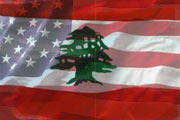Tuesday, February 21, 2006
This blog is moving! Update your bookmarks!
From now on, you can access the blog at the following address:
www.beirutbeltway.com
It's a brand new site,with added features, such as the newswire, which has live news feeds.
Please update your bookmarks and newsreaders.
To subscribe to the new site's feed, use this (Atom). There is also an RSS feed.
I hope you enjoy the new site. I welcome your comments and suggestions.
As for this blog, I was able to transfer all my posts, but not the comments. I will not delete this blog, so you will be still able to access the posts and their comments. But there will be no posting activity here as of today.
Thank you. Don't forget to bookmark the new site.
www.beirutbeltway.com
Sunday, February 19, 2006
Aoun the national painkiller
In his press conference today, Aoun was less belligerent than ever. His apparent victory in imposing his "consensus candidate" could be seen as the first of many deals to come with the March 14 grouping, who need Aoun's support on the presidency issue.
March 14 will find Aoun's offer hard to refuse. Here's what he is proposing: Elect me. I have an understanding with Hizbullah, others such as Boutros Harb don't. And if you don't agree with me, there is always parliament and the cabinet to resolve conflicts.
Since his return from exile, Aoun has been trying to repackage himself as the only available candidate. With FPM politicians still describing 1559 as a resolution serving "Lebanon's interests and independence", it is hard to believe that the FPM would risk alienating its base by giving it all to the pro-Syrian factions.
The jury is still out on how much Tuesday's rally, the understanding with Hizbullah, and other pandering to pro-Syrian parties, have cost Aoun on the Christian street. But one thing is certain. Aoun has successfully positioned himself as the only viable presidential candidate. Despite the momentum gained from Tuesday's rally, March 14 will not be able to sell any other candidate to Hizbullah and Amal, unless their plan is that of an all-out collision with the Shia parties and Aoun's FPM, which I find unlikely, despite Jumblatt's fiery speeches.
The March 14 grouping is also desperately trying to take care of last year's unfinished business, beginning with Lahoud's removal. And if one of their mistakes last year was in alienating Aoun, I think they will go out of their way to win him back. That is not to say Aoun does not need March 14. The Tuesday protests sent him a strong message that he cannot pursue his presidential project by ignoring the March 14 crowd.
Now that both Aoun and March 14 need each other more than ever, my guess is that a deal on the presidency will soon be reached between the two camps. The agreement on Dakkash was a sign that such a deal is possible. And with Hizbullah and Amal already denouncing the plan to remove Lahoud, calling it a "threat to the Shia community", a compromise Aoun presidency seems like the only option available to March 14.
In less than a year, Aoun transformed himself from an aggressive anti-Syrian antibiotic of sorts into a national painkiller. He is not always effective, but the country needs temporary relief from the pain that's tearing it apart. Those banking on deals between the current leaders to heal the country will be disappointed. There is a lot to be done, including corrective legislative action, a new electoral law, and a comprehensive development plan for those parts of the country where government is both absent and being absented.
Friday, February 17, 2006
British Islamist goes to Lebanon to fight holy war
Read this:
Quoted from The Sun (do take it with a grain of salt):
THE organiser of London’s Muslim cartoon protests has gone abroad to fight holyIt is bad enough Bakri is allowed to roam freely in Lebanon, but now that we suspect that his companion plans to join him to "accelerate Jihad", can you dispatch someone to investigate?
war — leaving taxpayers to foot the bill to keep his family.
Anjem Choudary, 38, walked out on Rubana Akhgar to launch a new Islamic fundamentalist group in Lebanon.
But his wife will not have to worry about money when he’s gone — she gets £1,700-a-month in state handouts.
And Choudary himself raked in thousands in benefits for years while plotting to destroy British society.
Rubana, 34, was heartbroken after he followed his evil hero Omar Bakri to Lebanon.
Choudary returned to organise the Danish Embassy outrage, where protesters carried banners proclaiming: “Behead Those Who Insult Islam.”
He found time to visit Rubana, sons Luqman, six, and Hediyah, one, and daughter Bintanjan, eight, amid fury over the protests.
But he left his Muslim wife in tears by vowing to go back to Lebanon soon to accelerate his campaign of “Jihad”.
She told a friend: “We wanted him to stay but there’s nothing I can do to stop him. He’s thrown himself into leading this new Muslim group and doesn’t live here any more. We will miss him but we’ll be OK on housing benefit and income support.”
Rubana gets around £1,000-a-month housing benefit, £360 income support, £160 child benefit and £192-a-week child tax credits.
Her husband claimed £202-a-month income support until last September.
Choudary — son of a Kent market trader — has plunged himself into leading Al-Ghurabaa, a group which preaches to young Muslims and verbally attacks Western democracy.
He used to help poisonous preacher Bakri run the now defunct extremist group Al Muhajiroun, which wants to turn Britain into an Islamic state.
Lawyer Choudary quit his job at a London solicitor’s firm after being seduced by Bakri’s twisted creed. He claimed thousands in income support, job seeker allowance and housing benefit.
The bearded fanatic first achieved notoriety in 2001 by describing the September 11 bombers as “heroes”.
He hit the headlines again in 2003 after calling the Colombia Space Shuttle disaster “an act of God” and saying Muslims would not be shedding any tears.
Choudary sparked fury by defending the embassy protests over the Danish cartoons of the prophet Mohammed earlier this month. He crowed to Newsnight’s Jeremy Paxman that Britain belongs to Allah.
Choudary has been staying with his British-born wife and their children for several days at their rented ground-floor flat in East London.
Most of his trips out have been with his family to the local mosque. He now wears an unkempt beard and traditional Shalwar Kameez robes.
Quizzed outside the home yesterday, Choudary warned sternly: “You’ve made a big mistake coming here.”
IN BEIRUT, Bakri has warned Britain could be the target of another terror attack as a result of the cartoon row.
Bakri fled Britain last summer amid calls for him to face treason charges.
Cheers.
Concerned Lebanese blogger.
Thursday, February 16, 2006
Nasrallah and national consensus
Enter Lebanon’s living fossil:
Hassan Nasrallah, who has just received a fresh shipment of weapons via Syria, said that “the resistance does not need a national consensus to exist,” and that ”the party weapons are purchased to confront the Zionists who want to harm our nation."
He will continue to override Lebanese institutions until a “clear defense strategy” is formulated.
“Our resistance will go on until a clear strategy to defend Lebanon is formulated," he said.
And Aoun agrees with him.
Nasrallah added that the memorandum of understanding with Gen. Aoun demands that a defense strategy to protect Lebanon should be set forward by the Lebanese.Nasrallah of course is bluffing the Lebanese people. Such a strategy, to be viable and sane, would have to involve the Lebanese army, not a militia. It would require centralized government control over war and defense matters. It would require a clear set of national security objectives, which would negate the existence of a “party” such as Hizbullah. Lebanon is not Iran, and defense matters cannot be delegated to a militia. We don’t need a Basij. Not even Syria does it this way.
Nasrallah’s defense strategy “does not need national consensus”, he insolently added (even though it has to be "set by the Lebanese"). But all other matters, such as an international tribunal to bring criminals to justice, the widening of a criminal investigation into ACTUAL terrorist attacks on the country—these matters REQUIRE national consensus, according to the Party of God. I mean Hizbullah suspended its participation in the government because of alleged “lack of national consensus”. And now Nasrallah wants to exclude from that his weapons. Correction. He never really cared about consensus. What with his constant derision of the “imaginary majority”, and calling popular speeches embraced by hundreds of thousands recipes for civil war.
Nasrallah warned that some of the speeches made at Tuesday's rally to mark to the first anniversary of former Prime Minister Rafik Hariri's assassination could lead to a civil war. He said that the language used by some speakers aimed at escalating the situation, in reference to Druze leader Walid Jumblat's comments at the Feb. 14 rally held at Martyrs' Square. Nasrallah called for dialogue among the Lebanese and considered Hizbullah's offer for unconditional dialogue a concession by the Shiite group.This is Hizbullah for you. A civil war, in its dictionary, takes place when there is no dictator running the country and using it in a proxy fight against humanity’s alleged perpetual enemy, Israel. Dialogue with other Lebanese is a “concession.”
I have to give Aoun one thing. If it weren’t for his cozying up to it, Hizbullah would probably be in dangerously desperate isolation. I don’t envy him though. It must not feel nice to be Hizbullah’s buffer against the rest of Lebanon.
Tuesday, February 14, 2006
One million and an alliance
 Future TV and Naharnet estimated around a million Lebanese filled Martyrs' Square in downtown Beirut today to commemorate the killing of Rafik Hariri. One year ago exactly I woke up at the same time I did today and read the news of an explosion in downtown Beirut. Less than an hour of anguish later, I and millions of others learned the news of his death by a powerful bomb in the very quarter of the city he rebuilt.
Future TV and Naharnet estimated around a million Lebanese filled Martyrs' Square in downtown Beirut today to commemorate the killing of Rafik Hariri. One year ago exactly I woke up at the same time I did today and read the news of an explosion in downtown Beirut. Less than an hour of anguish later, I and millions of others learned the news of his death by a powerful bomb in the very quarter of the city he rebuilt.Today is a day of remembrance that comes after much disillusionment. As I watch hundreds of thousands waving Lebanese flags, albeit with less purpose than a year ago, I can’t help but wonder: now what?
When Saad Hariri, Walid Jumblatt and Samir Geagea held hands and addressed the crowds directly, it became clear they were seeking a mandate for a stronger and more potent alliance. A response of sorts to Hizbullah and Aoun that drew sharp political boundaries. In his speech, Jumblatt accused Bashar of being a terrorist, and demanded the Lebanese army be sent to the border region and the southern suburb. Saad said there will be no compromises.
The hope is that this renewed alliance, which should no longer go by "March 14", will stand up for Lebanon through action and not just words.
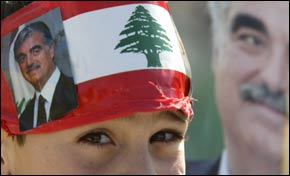
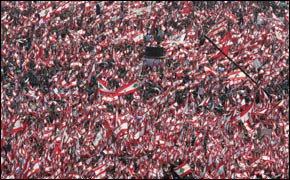

Update: Naharnet has summaries of the key speeches in English. (Saad's, Jumblatt's, Geagea's)
Update 2: An-Nahar has an excellent set of pictures here. (pdf)
Monday, February 13, 2006
The Daily Star does Syrian propaganda
With Lebanon still reeling from Syrian terrorism and destabilization tactics, the latest of which was a Syrian sponsored Islamist attack on Christians, the Daily Star goes to Syria for some propaganda under the title "Islamophobia: A second Holocaust in the making."
Shaaban basically emulated an Iranian revolutionary guard "commander" who said last week that democratically elected German chancellor Angela Merkel "thinks she's Hitler."
It gets better. Here it comes:Germany, once again, apologizes for the Holocaust and is willing to do what it takes to redeem itself - even if it was financing a second Holocaust against the Palestinian people...
It seems like a new crusade has started against Arabs and Muslims in the wake of September 11, 2001, led by neo-European Nazism. The victims are no longer the Jews, but Muslims spread over Afghanistan, Iraq, Palestine, Pakistan, and anywhere around the globe.
The wars, bombings and secret prisons where suspect Muslims are tortured and killed are but few aspects of the "crusade" U.S. President George W. Bush launched. Was it not for so much contradictory evidences, we could have passed it for another of his many misfortunate slips of the tongue.
Along a number of unjustified wars, sanctions and pressure policies against Arab and Muslim countries, intensive media campaigns rally to deform the face of Muslims and Islam. Even as citizens of Western democracies, Muslims find themselves subject to legal and political acts of hatred and harassment.Yes, Shaaban's Syria is part of the crusade against Islam. This makes us, Lebanese people who want justice, crusaders bent on destroying Muslims everywhere. Never mind that Shaaban's master and his father before him killed and jailed more "Muslims" than an actual crusade.
Shaaban then launches a tirade against Denmark, "the country heading the spear of hatred against Islam and Muslims." WHERE IS JUAN COLE? One of his idiotic posts claimed there is no evidence that Syria and Iran were inciting riots. To prove that, he said he looked in FBIS (the CIA's media monitoring database) and Lexis Nexis and found no articles in the Syrian press containing "Syria and Denmark". I posted a comment correcting him, but he doesn't publish comments that prove him wrong by pointing out the levels of access in FBIS, and the fact that it is stupid to look for evidence of such incitement in the Syrian media. Or that he misspelled Condoleezza Rice's name when he said: "Condaleeza Rice is a Liar. " (Who gave him a PhD?)
More from Shaaban:
Within this context, the cartoon contest organized by Yandposten came as a natural result. Facts show that Europe is launching a new Holocaust against Muslims around the world. What is happening to Muslims in Europe today is almost identical with what the Jews suffered at the beginning of the century.Yes, millions of Muslims in Europe are being put on trains and sent to gas chambers. Good work, Daily Star editors! Why bother intervene on the side of good journalism?
And then this jewel:
"Freedom of the press" and "freedom of expression" do not permit violating or ridiculing other people's sanctities.Ignoring the Syrian regime crimes against the Lebanese press for a second, I will let this February 8 story from AFP answer her:
DAMASCUS, Feb 8, 2006 (AFP) - Syrian security services pressed a clampdown on dissidents this month despite their inaction in the face of violent protests outside European diplomatic missions in Damascus, a leading rights lawyer said.Finally, this:
On Tuesday evening, agents arrested writer Adel Fayad in the Mediterranean port of Tartus for publishing articles opposing the regime on the Internet, said lawyer Anwar Bunni, who heads the Syrian Centre for Legal Studies.
Interpreter Abdul Mughith Habab was meanwhile due in court on charges of insulting President Bashar al-Assad after being first detained a month ago for mentioning the existence of courts of exception under Syria's 43-year-old state of emergency to journalists he was working for.
Students, Ali Ali and Hussam Melhem, were also detained in Damascus 10 days ago for setting up a discussion group, Bunni added.
"The Syrian authorities are tolerating acts of violence perpetrated by demonstrators against European embassies but are severely repressing peaceful activities," he complained. He was referring to a large demonstration Saturday against the publication in Europe of cartoons of the Prophet Mohammed which saw the Danish mission stormed, with serious damage done to the Chilean embassy, and the Norwegian mission also attacked.
Nazis accused Jews of violence and terrorism. They launched media wars of hatred against their faith and sanctities. The result was the Holocaust; one of the ugliest crimes against humanity.How about Syria's crimes against humanity? How about the Syrian media's war of hatred against Lebanon? What about the murder of journalists and men who dared say no to the Syrian dictator? Who are the Nazis here?
How about the Daily Star publishing this rubbish today of all days?
Freedom of speech? Not for those who kill free people. And not when the Daily Star collects donations in the name of supporting "free press in Lebanon."
Saturday, February 11, 2006
A state of citizens
…Fellow comrades in the opposition, whether you are new or veterans, take to the streets and you will hear it. You will hear with it a call for you to take the initiative for an uprising of a different kind, an uprising against the self that would - in the aftermath of the end of the Baath regime's mandate - pave the way to the building of a modern state, a state of citizens and not a state of subjects. (Samir Kassir, April 1, 2005. )These words deserve a permanent post, and I am tempted to leave them at the top of every piece I write, for they express exactly what our country needs. Samir Kassir died a true martyr for his country. Is it strange for me to be thinking of him on the eve of the first anniversary of Hariri's assassination? No.
Rafik Hariri became a national symbol only after the Syrian regime took him out. His death fueled one of the strongest opposition forces in modern Arab history. On February 14, Lebanon lost a great yet fallible leader whose vision, though not perfect, lives on in the city that embraced him in death, as it did in life.
The continuous arrogance of the Syrian regime and its Lebanese cohorts drove Lebanese into two different camps. There were the ones who saw no hypocrisy in supporting a murderous regime that kills their fellow compatriots in the name of protecting them from a great conspiracy. Hizbullah.
And then there was the March 14 variety: the darlings of the western media, which saw in them the germs of democracy and the unprecedented will to swim against the current. These, for a short while, put their ideological differences aside to unite in calling for an end to the Baath era. The young and patriotic of them camped near where their fallible leader had fallen, and peacefully demanded change.
Freedom square. I've seen it in pictures. I was there in spirit and in unshed tears. They waved my flag and told the butchers to go home. And I watched from the comfort of my beltway home.
 But my distant friends had no leaders. The speeches delivered to them by the "opposition" betrayed the spirit that carried these unpopular figures to the freedom podium. On March 14, when the line was drawn in red, white and green, Nayla Mouawad, Gebran Tueni, and Bahia Hariri could not fit the new mold. Michel Aoun called in, but the air around his words felt contrived and opportunistic.
But my distant friends had no leaders. The speeches delivered to them by the "opposition" betrayed the spirit that carried these unpopular figures to the freedom podium. On March 14, when the line was drawn in red, white and green, Nayla Mouawad, Gebran Tueni, and Bahia Hariri could not fit the new mold. Michel Aoun called in, but the air around his words felt contrived and opportunistic.My young revolutionaries had no real representatives. The spirit of the revolution had nobody to articulate it and translate it into a project for a new Lebanon. The Future Movement wanted to continue a project, though visionary, was ill-defined and faulty on many levels. Walid Jumblatt could not stick to one position long enough for it to gel into a project. Qornet Shahwan was ineffective and unpopular. Michel Aoun came home and pulled the plug. The reality of what was needed was overrun by posthumous myths and politics as usual.
Nobody stood there, except maybe Samir Kassir, to tell us that the agent of change had to come from us, not from them. None of the ones who borrowed our revolution taught us how to build a state of citizens, not subjects. Samir Kassir tried, but darkness soon swallowed his light. And then many of us were lost. We forgot that patriotism is hollow without a sense of civic duty towards our country and our fellow citizens. You can wave two million flags, but if you still cannot stand in line or be courteous to others and give them the same rights that you give yourself, you cannot call yourself an agent of change.
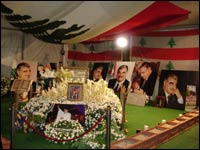 When I finally visited in October, I stood by Hariri's grave and tried to take in the leftovers of the fabled March 14 spirit. For it was there, in the pictures and the writings on the walls that guarded the undying spirits of the murdered. I felt the spirit but saw it disappear at borders set up by the guardians of the grave, who looked like they belonged to a clique and not a nation. It hit me then that part of my sadness came from my realization that the revolution had shrunk and was confined to a small area. Outside that area Lebanon seemed like a weary version of its old incomplete self. People were living in fear, bomb detectors were everywhere, and the news screamed division. Instead of the people of the revolution, I saw puppets of interests, opportunistic politicians and shadowy figures on revenge missions invading public squares and television screens. Was the revolution a myth, I asked myself? The answer came from the faces of the men and women on the wall. The spirit was there, but the message was not carried far enough. It died as soon as it reached the hands of those we let climb the podium.
When I finally visited in October, I stood by Hariri's grave and tried to take in the leftovers of the fabled March 14 spirit. For it was there, in the pictures and the writings on the walls that guarded the undying spirits of the murdered. I felt the spirit but saw it disappear at borders set up by the guardians of the grave, who looked like they belonged to a clique and not a nation. It hit me then that part of my sadness came from my realization that the revolution had shrunk and was confined to a small area. Outside that area Lebanon seemed like a weary version of its old incomplete self. People were living in fear, bomb detectors were everywhere, and the news screamed division. Instead of the people of the revolution, I saw puppets of interests, opportunistic politicians and shadowy figures on revenge missions invading public squares and television screens. Was the revolution a myth, I asked myself? The answer came from the faces of the men and women on the wall. The spirit was there, but the message was not carried far enough. It died as soon as it reached the hands of those we let climb the podium.It is also not normal to let this day's popular movement disperse even if it's hard to keep it at its current climax. It becomes as if it [the opposition] is telling citizens: Well done. Go home now. We will call if we need you!That's essentially what many, especially Aoun, did. He called it off as soon as he returned to the country. For him, the popular movement expired upon his holy return, which he saw as the objective, a prelude to making himself president. The others did not behave better. Listen to Samir. He said this before the parliamentary elections but no one heard.
Meanwhile, it is unacceptable for the opposition to give itself the image of the club of candidates to parliamentary elections. Even if Lebanon's parliament needs new blood, this does not mean that under the banner of renewing political life, the opposition makes citizens feel that all opposition figures are position seekers.They all ran, didn't they? Even though many of them weren't our choice. They clawed one another and finished off a spirit they failed to faithfully embody. We got electoral lists of old faces on newly assigned missions bigger than they can handle. They didn't trust the people to bring in new faces. They didn't trust our judgment, so they didn't bother with programs to deliver us to the shore. They wasted our time on meaningless alliances that led the country to ruin. Rafik Hariri died many times this past year. He died with every bomb from Syria, obstruction from Nasrallah and Aoun, reversal from Jumblatt, and hesitation from his own son, Saad.
But if they all, intentionally or unintentionally, forgot the revolution, why did we? Why did so many of us return to our sectarian barracks? That's because we were not true citizens of this nation. We led an uprising exclusively against the other but not against the self. And I had to stand by the grave of my fallen fallible leader to recapture an essence lost to political manipulation and national immaturity.
On February 14, we should all go back to the grave to remember the spirit we lost. Do it for nobody's sake but your own. Let it be a silent protest of one amid millions. Carry your flag near your heart and let no one but yourself speak for you. Let the silence of your protest drown their failure to represent your dreams. Lift the banner calling for change, end to terror, and birth of a new state. Let it be Samir's "uprising against the self." Find the citizen in you, not the subject. And then find the way to the "state of citizens."
Only a state of citizens can fight the enemy and win. March on, fellow citizens.
Thursday, February 09, 2006
Hizbullah and the missing revolution
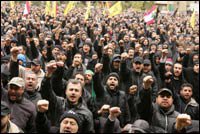 And you thought Sunday’s riots were scary. Hundreds of thousands of professional weepers gathered on Thursday to be manipulated by the man who thinks of himself as God’s deputy. Hassan Nasrallah, the leader of the "oppressed" and official defender of Lebanon, gave himself the right to spill blood in the name of defending the prophet, but still found the act of burning a building "uncivilized".
And you thought Sunday’s riots were scary. Hundreds of thousands of professional weepers gathered on Thursday to be manipulated by the man who thinks of himself as God’s deputy. Hassan Nasrallah, the leader of the "oppressed" and official defender of Lebanon, gave himself the right to spill blood in the name of defending the prophet, but still found the act of burning a building "uncivilized"."Defending the prophet should continue all over the world. Let Condoleezza Rice and Bush and all the tyrants shut up. We are an Islamic nation that cannot tolerate, be silent or be lax when they insult our prophet and sanctities."Nasrallah told Bush and Rice to “shut up” for daring to accuse Syria and Iran of inciting riots over the Mohammad cartoons, but gave himself the freedom to utter another shameless defense of the regime that killed some of Lebanon's best leaders and thinkers. I won't bother pasting what he said regarding "dragging" the country into a war with Syria.
"We will uphold the messenger of God not only by our voices but also by our blood," he told the crowds, estimated by organizers at about 700,000. Police had no final estimates but said the figure was likely to be even higher.
I will say this though. The sight of hundreds of thousands of men and women rallying around this man and his party is disheartening. It tells me that many people in my home country prefer the darkness of one ideologue over the light of luminaries. Luminaries like Samir Kassir whom we lost forever. National Leaders like Rafik Hariri, Bassel Fleihan, Gebran Tueni-- who with all their faults and biases, we lost before they were allowed to act in the freedom they sought.
It is very difficult for me to watch hundreds of thousands of “Lebanese” worship Hizbullah as a national/religious entity. They are turning the Shia community into a time bomb. Nasrallah can act patriotic all he wants, but he is laying the ground for the disintegration of Lebanon into sectarian cantons. That silly agreement with Aoun will be relegated to oblivion once the masses Nasrallah is breeding find themselves forced to choose the Islamic nation over a pluralistic Lebanon.
Forgive my bleak view on the eve of February 14. But, as I have said before, Lebanon is being told to choose Hizbullah’s way, or the Beirut Damascus highway. Both lead to a country enslaved by failed causes and oppressive dictatorships. There is no future for Lebanon with Hizbullah in the game. They are simply too powerful for the country to handle. Unfortunately, the men who can make a difference are either dead or weakened by the same sectarian formula that, ironically, guarantees Lebanon’s unity.
Maybe one day all Lebanese will realize that our salvation lies not in Hizbullah, Aoun, Berri, Jumblatt, Saad Hariri or any of the "March 14" figures. It lies in the men and women of the revolution that never took place in Lebanon.
Monday, February 06, 2006
The battle for Lebanon
What Hariri and the main Sunni establishment naively thought would be a peaceful protest went horribly wrong. The Future Movement and Dar al-Fatwa made a fatal mistake that will probably cost them dearly in Christian circles. You just do not send hordes of angry Muslims into a Christian neighborhood to "defend" Islam and the prophet. The riots that ensued should have been foreseen. Syrian agents, Palestinians from the pro-Syrian PFLP-GC, and a number of Islamists elements from Tripoli and the Ein El Helweh refugee camps took advantage of the apparent laxity of the security forces and torched the building housing the Danish embassy, before spreading their unjustified anger to Christian churches.
Lebanese Christians were told to fear the extremist Lebanese Sunnis, who come courtesy of Saad Hariri. The Syrian smear machine has always accused Saad of supporting fundamentalists, and now the proof was presented in Ashrafieh. It is hoped that Lebanese Christians will see through these pathetic attempts to terrorize them and prostitute them to serve Syrian interests.
The strongly worded March 14 alliance statement today reflected the gravity of the situation. It came as Michel Aoun and Hassan Nasrallah were meeting in a church, where the former general continued to use his constituents as a jumping board to the presidency. The message was clear to Christians: Aoun is the only protector, and better Hizbullah than the fundamentalist Sunnis. Aoun has made his strategic choice: An alliance with pro-Syrian, Iranian-funded Hizbullah to support his presidential bid. There was no mention of the Hariri investigation or Syria's terror campaign.
The statement released by the March 14 alliance described the Sunday riots as a Syrian-engineered coup attempt to "turn Lebanon into a second Iraq." And I don’t think they were only referring to the violence and the spread of al-Qaeda types. The alliance read the Sunday events as an attempt to marginalize the Sunnis in Lebanon and put their fate in the hands of a few pro-Syrian extremist organizations such as the Syrian intelligence run al-Ahbash and the Jamaa Islamiya, as well as “al-Qaeda.”
According to the statement, Lebanon is now playing host to a group of Jordanian Islamists who have entered Lebanon and settled in the northern Akkar region. A large number of "Syrian special units" have also entered the country, accompanied by “non-Lebanese” elements from the PFLP-GC two days before the protests. Large sums of money were transferred by a “regional non-Arab state” (meaning Iran) to a number of pro-Syrian organizations and figures. And Syrian Intelligence has increased its activity and widened its presence in the north, where a large recruiting campaign is underway to build “special forces.”
For that, the March 14 alliance statement asked the cabinet to submit a complaint against Syria to the Security Council, and demand the Arab League hold an emergency session to look into this matter.
The list of demands is actually long. It includes: Lahoud’s removal; disarming all militant organizations that receive orders from the Syrian regime and intelligence, and investigate their sources of funding; sacking all security officials involved in the smuggling of arms through the borders and who have shown laxity in preventing riots.
The March 14 alliance meeting took a swipe at the Justice Minister and gave him one week to answer a list of questions regarding the fate of the investigations into the different bombings since October 2004, as well as the Madina Bank scandal and the oil for food scandal.
The most important demand, however, was asking the Lebanese government to spread its authority over all of Lebanon, send the army to the south, demarcate the border, especially in Shebaa, and “remove Palestinian weapons outside the camps, organize it inside the camps, and reject the existence of off-limit security zones on Lebanese territory.”
The March 14 alliance here is going all-out against Syria and its allies. Hopefully it is not too late. Months of wasted time spent coaxing Hizbullah and sometimes Aoun has cost them and Lebanon dearly. After the Sunday riots, Aoun and Nasrallah appeared to be pulling the rug from under their feet by announcing an alliance that reeks of hypocrisy and treason.
Reading a prepared statement, Abu Danab and Bassil stressed the importance of a national dialogue as the only way to resolve pending issues. They called for a consensus democracy to uphold the spirit of the constitution and a new modernThe above is nothing short of an attempt to rewrite the constitution to fit Hizbullah’s war goals and Aoun’s presidential aspirations. A “consensus democracy”, with undemocratic Hizbullah and opportunistic Aoun at the helm, appears like a strange hybrid of an Islamic state and a presidential democracy. One should not be fooled here. Regardless of the viability of this alliance, Aoun has just sold the country to Syria and Iran to become President. This alliance appears to be more than just between Hizbullah and Aoun. It is, for all practical purposes, with the Syrian regime. As I said above, security in Lebanon, Syria's terror campaign and the Hariri investigation were not even mentioned. Did Aoun receive guarantees from the Syrians through Hizbullah? Time will tell.
electoral law.
Hizbullah and FPM linked the disarmament of the Party of God to the liberation of the Shabaa Farms in response to UN Security Council Resolution 1559.
Nasrallah and Aoun, also appearing in public to cement their understanding, jointly pledged that Lebanese who had fled to Israel in the aftermath of the May 2000 liberation of the South would be treated 'fairly' by the Lebanese justice system if they chose to return home.
Aoun, for his part, renewed his demand for an audit of money spent by successive governments since the end of the war that allowed the public debt to spiral to US $38 Billion, one of the highest in the world.
In response to a question, Nasrallah said Aoun was a genuine candidate for Presidency, insinuating that the erstwhile rivals have discussed the potential successor to President Lahoud.
Nearly one year after the assassination of Hariri, attempts to reverse the positive changes in Lebanon are underway. Hizbullah and Aoun are now leading those efforts. With the battle against Siniora’s government now aiming to create a rift between Sunnis and Christians, the March 14 alliance and the Future Movement has to fight back not with complaints, but with action. At stake is the country’s independence and democratic future.
Addendum: My bad, the "understanding" does mention the Hariri investigation, however it does not mention it in the context of Syrian guilt. The "understanding" rejects the politicization of the investigation by Lebese elements, yet it ignores Syria's role in delaying and obstructing it, not to mention Hizbullah's shameful defense of the Syrian regime.
How does one build a modern nation on denial and "understandings" designed to keep one party's arms, and give the other party a presidency? Speaking of "consensus", where is it when a large number of MPs and Lebanese want to see Syria held accountable? Are they not part of that "consensus"? And who has been outside the consensus for the past year?
Sunday, February 05, 2006
The rule of ignorance
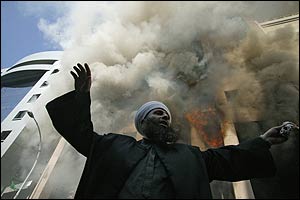
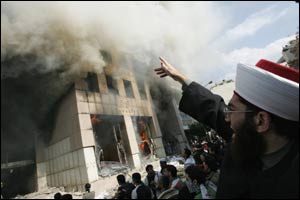

With lawless breeding grounds like this, how can ignorance not spread?
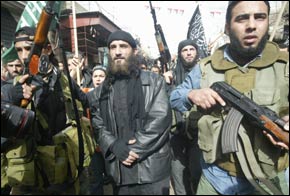

These images speak for themselves. What a shame. The entire Lebanese cabinet, especially the ministers whose party sanctioned this, should resign. Condemnations are NOT enough.
UPDATE. Interior minister Hassan al-Sabaa has resigned. He reportedly submitted his resignation during an emergency cabinet meeting after coming under fire for failing to control the riots, shown above. Sabaa said that the protesters included dozens of Palestinians and Syrians, who, in addition to torching the Danish embassy, attacked the adjacent St Maroun Church.
Friday, February 03, 2006
Israeli terror in a divided nation
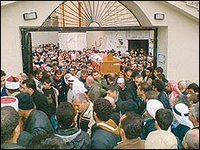 Ibrahim Youssef Rhayyel was found dead inside the Lebanese border on Wednesday, reportedly killed by 3 Israeli bullets, UNIFIL confirmed on Thursday. He was a 17-year-old shepherd. A shotgun was found near his body. Around the same time of the murder, an Israeli reconnaissance plane violated Lebanese airspace, flying over Tyre, Sidon, and Naameh.
Ibrahim Youssef Rhayyel was found dead inside the Lebanese border on Wednesday, reportedly killed by 3 Israeli bullets, UNIFIL confirmed on Thursday. He was a 17-year-old shepherd. A shotgun was found near his body. Around the same time of the murder, an Israeli reconnaissance plane violated Lebanese airspace, flying over Tyre, Sidon, and Naameh.The Israeli army claimed they fired at a "an armed man with binoculars [who] was seen crossing the U.N.-demarcated border. When he opened fire, Israeli soldiers responded and apparently hit him." The location of the body seems to refute that claim, even though the results of the autopsy said the boy was shot from a distance of 50 meters. There were reports in the National News Agency and in as-Safir that claimed an Israeli commando unit had infiltrated the border.
By Friday, UN secretary general still had not received UNIFIL's report confirming this was an Israeli operation.
The UN Secretary General Kofi Annan's spokesperson Stephane Dujjaric said: "The UN cannot comment on the incident until they have received a formal copy of the investigations. As far as we are concerned, the investigations are ongoing."This cold and insensitive statement was used by Hizbullah as proof that "most of the Lebanese people, did not trust the international body to take action against Israel."
"We don't even expect them to denounce the incident," Nayef Mousawi, Hizbullah's "foreign affairs official" said, referring to the statement above. "We know how to take our rights with our own hands."
Hizbullah will probably retaliate soon. Now that Lebanese Prime Minister Fouad Siniora has re-conferred the "national resistance" title upon them, paving the way for the militant organization to end its 6-week boycott of the cabinet, they will continue to act as Lebanon's only defense force against Israeli aggression.
This begs the following question. The Lebanese flag wrapped around Ibrahim’s coffin notwithstanding, must we keep the issue of retaliation to Israeli terrorism the sole property of Hizbullah? Jumblatt has reiterated his call for sending the Lebanese army to the south and reviving the armistice treaty with Israel. And yeah, settling the ridiculous Shebaa farm dispute, where the shepherd was killed. Had the issue been resolved, had there been an army in the south, then the Lebanese government’s condemnation of Israel would have found more ears in the world. And maybe Rhayyel's father would have asked the government, not Hizbullah, to avenge his son's death.
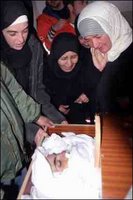 Blame Israel, blame American bias towards Israel, blame Hizbullah, blame Syria, and even blame the shameful international and UN silence, but also blame a cabinet weakened by indecisiveness. We have been demanding that Syria respect our sovereignty. We have rightly rejected Syrian plans to hijack that sovereignty. We ask the same of Israel, yet our efforts to deal with that struggle are hampered by this unwillingness to take on the issue directly. How will Israel be stopped if we don’t seem to care about establishing an official presence on the southern border? Let them try violating our airspace and killing our people with our army on the border. Then watch Lebanese rally around their national army and state, as opposed to an unrepresentative religious militia. Give Lebanese the opportunity to own and direct that struggle.
Blame Israel, blame American bias towards Israel, blame Hizbullah, blame Syria, and even blame the shameful international and UN silence, but also blame a cabinet weakened by indecisiveness. We have been demanding that Syria respect our sovereignty. We have rightly rejected Syrian plans to hijack that sovereignty. We ask the same of Israel, yet our efforts to deal with that struggle are hampered by this unwillingness to take on the issue directly. How will Israel be stopped if we don’t seem to care about establishing an official presence on the southern border? Let them try violating our airspace and killing our people with our army on the border. Then watch Lebanese rally around their national army and state, as opposed to an unrepresentative religious militia. Give Lebanese the opportunity to own and direct that struggle.The resistance against Israel should not be run the way it is run today. It needs to involve all of Lebanon. All Lebanese should have cried at the picture of the relatives weeping over the dead boy's body. It should have had the same domestic and international impact Syrian terrorism has. However, the south continues being the property of a militia and not the Lebanese government. And Lebanon remains divided. The return of the five ministers and Siniora’s word game will do little to reunite the country, let alone stop Israel.
UPDATE. As expected, Hizbullah has retaliated. Their guerillas fired rockets at an Israeli army post in the Shebaa farms on Friday.
Thursday, February 02, 2006
Aniconism and fundamentalism: the case of the Danish cartoons
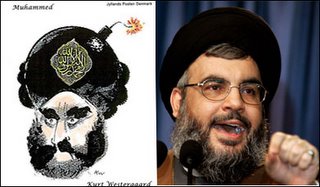
Denmark, with all the cows and the milk and the sacred freedom to utter nonsense and print garbage, is now a threat to Muslims everywhere. A few badly drawn cartoons, offensive yes, but harmful no, sparked a flurry of condemnation unrivalled in the Islamic world. And Hizbullah’s contribution to this debate: murder them all.
If there had been a Muslim to carry out Imam Khomeini's fatwa against the renegade Salman Rushdie, this rabble who insult our Prophet Mohammed in Denmark, Norway and France would not have dared to do so... I am sure there are millions of Muslims who are ready to give their lives to defend our prophet's honour and we have to be ready to do anything for that.So counter the stereotype of a murderous and jihad-obessessed prophet with a call for Jihad and murder. And top it off by attacking freedom of expression in a foreign country.
We do not understand the rationale of the Danish authorities who refuse to apologize under the pretext of freedom of expression.And who needs freedom of expression when you can have freedom of murder?
Who tells them that this freedom is absolute? OK, if someone decided to blow himself up himself somewhere in Norway or Denmark, then he is also free to do so.Yes, of course Nasrallah does not understand freedom of expression and confuses it with the freedom to kill, for he inhabits a totally different intellectual universe. Did the Danish paper intend this for readers in countries where Islam is a dominant faith? I think not. Did the cartoonist intend to offend Islam? Of course he did. Could he have gotten away with a cartoon doubting the Holocaust or attacking the Jewish faith? Probably not. But Orientalism and prejudice aside, who is Nasrallah to sanction the murder of Danish, French and Norwegian citizens, who live under different laws? And where is it but in the laws of religious dictatorships that governments feel responsible for the artistic actions of its citizens? For only in oppressive countries such as Nasrallah's beloved Iran and Saudi Arabia, can governments can try people for drawing lines and contours.
One should thank the Danish artists for unwittingly thwarting the attempts by Islamic religious zealots to render Islam aniconic, where all representations of living beings are prohibited, albeit the ones that glorify the leader. But perhaps their greater contribution was in not understanding that Islam prohibits the depiction of prophets and other religious figures. Correction: Sunni Arab Islam, for Persian art has plenty of miniatures depicting the prophet and his cousin, Ali. Islam might not have religious icons, but with so many leaders, Imams and religious figures immortalized in pictures and drawings, I no longer understand why it is a sin to give religious figures a human face. If that is not the idol worship that allegedly is the basis for banning pictures, I don't know what is. I bet you Muslim artists will do a better job at depicting the prophet. But that is not the problem today.
The problem lies with the people who preach and pretend to defend Islam. It’s people like Nasrallah, and ideologies like Wahabism, that have made Islam the easy victim of bad foreign art. Some in our region think that the problems in Islam started when “Muslims” could not agree on who should succeed the prophet. Yet very few, except a few luminaries in the west who enjoy the freedom to critically study the origin and development of religions, know that Islam is as much man-made as Christianity and Judaism. The religion developed in the Middle East, not Saudi Arabia as tradition claims. It was influenced and shaped by non-Muslims and Muslims alike. Hundreds of years of intellectual oppression hid the important fact that many of the traditions, including the ones cited in banning figural representation, were written to construct a religion that suited the temporal authorities. What we have today is no different. There is no attempt whatsoever to encourage Ijtihad or scholarship in the religion. We have a few old traditions rehashed and sometimes redacted to suit extremist and reactionary forces within the countries that sponsor them. And the poor people take it and don’t question any of it. Orientalism and ignorance are fought with more ignorance, fundamentalism and orientalism-in-reverse.
And the result?
Yesterday it was a call to massacre innocents, Muslims and Christians, to "defend" Islam. Today, it’s the same call albeit to terrorize the citizens of other nations, who have arguably supported the “Arab cause” more than most so-called Muslims. And it’s all done in the name of a construct that is being marketed as more than a religion, but that is being denied the opportunity to adapt and evolve. Result: more oppression and a death force that touches us all.
Wednesday, February 01, 2006
The French connection and how Bashar created 1559
Let's start with a secret trip to Damascus by Gourdault-Montagne in November 2003 to see Syrian President Bashar Assad. At the time, French-American relations were still in the deep freeze because of Chirac's refusal to support the U.S. invasion of Iraq, but the French were doing some early damage control.You will remember how Abdel Halim Khaddam (now silenced by the Saudis) held Bashar responsible for UNSC 1559, revealing in his Arabiya interview that Bashar had plenty of opportunities to stop the resolution but went with his plans to consolidate his power in Lebanon by extending Lahoud's term and then blaming the repercussions on Hariri, who was made to look like a traitor, when he was merely Lahoud and Bashar's perceived enemy in Lebanon.
Gourdault-Montagne brought the Syrian leader a message from Chirac and two other critics of the Iraq war, German Chancellor Gerhard Schroeder and Russian
President Vladimir Putin. The message to Assad was: The war has changed things in the Middle East, and you have to show you have changed, too -- by visiting Jerusalem or taking some other bold step for peace with Israel. The French were probably hoping to gain diplomatic leverage with Washington by acting as a peace broker, but that's not how Assad took it. "Are you the spokesman of the Americans?" he asked Gourdault-Montagne. Worried that France, Germany and Russia were joining a U.S. pressure campaign, a nervous Assad soon began trying to consolidate his control over Lebanon. He forced the reelection of Lebanon's pliant pro-Syrian president, Emile Lahoud, and began squeezing Syria's nemesis, Prime Minister Rafiq Hariri. That process culminated in Hariri's murder in February 2005.
Gourdault-Montagne began making his quiet trips to Washington in August 2004 to coordinate French-American efforts on U.N. Security Council Resolution 1559, calling for Syrian withdrawal from Lebanon. It was in the midst of a presidential campaign, and the French were obviously hedging their bets. After Hariri's murder, Washington and Paris collaborated in forcing a Syrian withdrawal under Resolution 1559. To discourage mischief by the Shiite militia Hezbollah, Gourdault-Montagne told the Iranians during a secret visit to Tehran in February 2005 to advise Hezbollah to play it cool.
Another important part in the article should silence all those who still think the Syrian regime is scoring victories against the US in the Security Council, or other nonsense about alleged deals.
In framing policy on Syria and Iran, the French and Americans have consciously played a good cop-bad cop routine. The Americans demand tough U.N. language; the French bring the Russians and Chinese on board for a slightly watered-down version. It's a classic diplomatic minuet, but it has probably produced tougher and better resolutions than would have emerged if either side went alone. An illustration is the compromise that came this week -- to refer Iran to the Security Council for its violations of nuclear agreements, but give Iran another month to comply before any formal recommendation. The French argue that it's crucial now to maintain international solidarity on Iran, even at the price of a brief delay. What's interesting is that the Bush administration seems to agree.Bonjour to all from inside the beltway.
…Paris and Washington still disagree sharply on the substance of many issues, but they seem to have concluded that they'll get more of what they want if they collaborate rather than bicker. Indeed, the quiet partnership has probably benefited from the fact that the world still thinks France and America are enemies.


